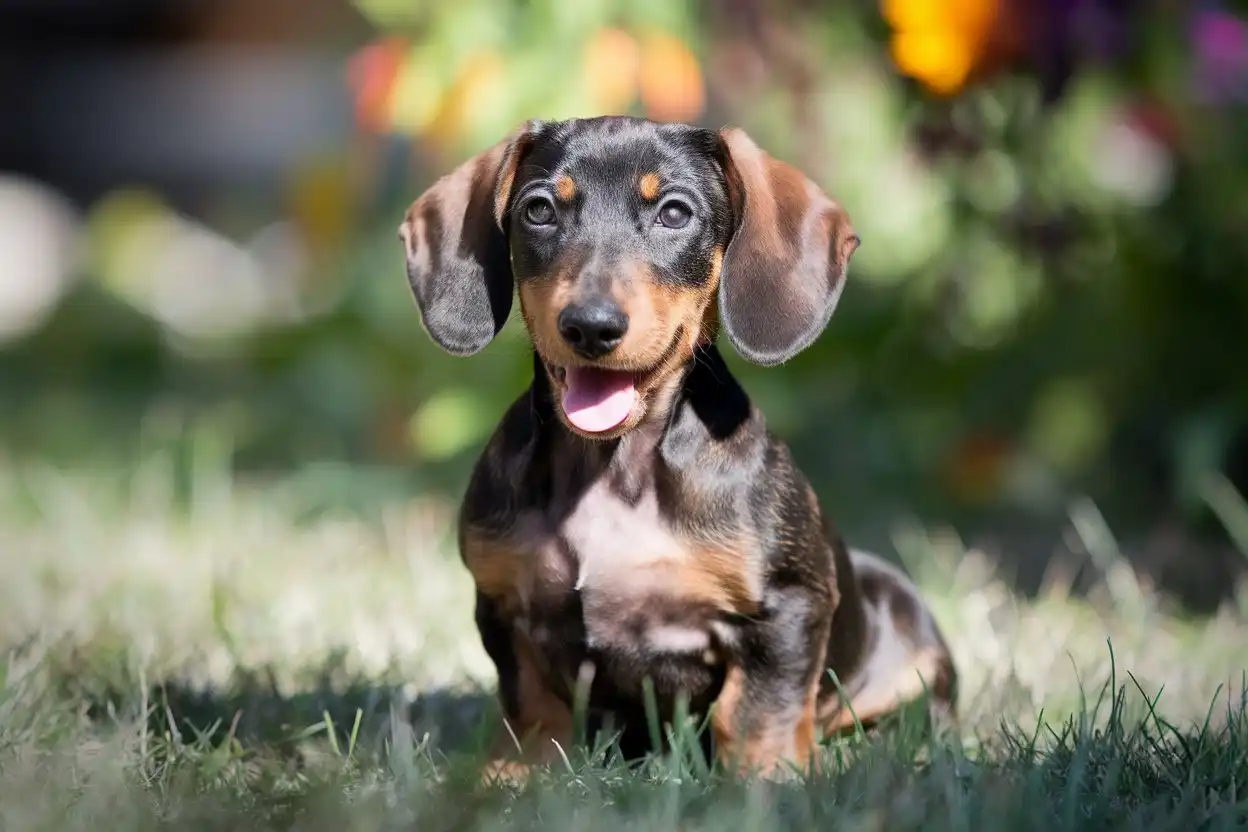Have you ever met a dog so tiny yet so full of personality that it instantly steals your heart? That’s the magic of mini Dachshund puppies, they may be low to the ground, but their charm soars sky-high. These adorable little companions are known for their bold spirit, loyal hearts, and yes, their famously funny “sausage dog” shape.
Whether you’re dreaming about bringing one home or you’ve already fallen under their spell, caring for a mini Dachshund goes beyond cuddles and cuteness. From understanding their unique temperament to meeting their specific puppy care needs, there’s a lot to learn and love about this special breed.
In this guide, we’ll explore everything you need to know to raise a happy, healthy, and well-behaved miniature Dachshund, while keeping things light, informative, and full of joy. Ready to discover the big world inside a tiny dog? Let’s dive in.
What Makes Mini Dachshund Puppies So Special?

If you’ve ever seen a mini Dachshund puppy toddle across the room with its short legs and wiggly tail, you already know they’re nothing short of heart-melting. But there’s more to these little pups than just their looks. Mini Dachshunds are full of character, loyalty, and charm, making them one of the most beloved small dog breeds out there.
Here’s why they stand out:
Big Personality in a Small Body
Miniature Dachshunds are tiny in size but huge in spirit. Don’t let their small frame fool you, they’re bold, curious, and often act like they’re ten times bigger than they are. You’ll notice them taking charge of their space, confidently exploring new areas, and always staying alert.
- They’re natural watchdogs, often barking to alert you of anything new.
- Despite their size, they’re surprisingly brave and determined.
- Many owners describe them as stubborn, but it’s just their strong will shining through.
Deeply Loyal and Loving
Once a mini Dachshund bonds with you, you’ve got a best friend for life. These puppies form strong attachments to their humans and crave being close, whether it’s curled up on your lap or following you from room to room.
- They love routine and feel safe when things are predictable.
- Mini Dachshunds tend to prefer one person but are affectionate with the whole family.
- They often suffer from separation anxiety, so they thrive in homes where someone is often around.
A Unique and Endearing Look
Their long bodies, floppy ears, and expressive eyes give mini Dachshunds a truly unforgettable appearance. Whether you choose a smooth, wire-haired, or long-haired variety, each coat type comes with its own charm and grooming needs.
- Smooth-coated pups are sleek and low-maintenance.
- Wire-haired Dachshunds have a spunky look and more texture to their coat.
- Long-haired types are soft and elegant but need regular brushing.
A Heritage Worth Knowing
Originally bred to hunt badgers, these little dogs have a rich history that explains their brave nature and strong prey drive. Their German name literally means “badger dog,” which tells you how determined they are when focused.
- Their instincts may lead them to dig or chase small animals, so keep an eye during walks.
- Mental stimulation and play are key to keeping their sharp minds busy.
- They benefit from games that challenge their natural tracking abilities.
Whether you’re already a fan or just getting to know them, it’s easy to see why mini Dachshund puppies bring so much joy. They’re not just cute they’re clever, full of life, and ready to become your loyal little shadow.
How to Care for Mini Dachshund Puppies the Right Way
Bringing home a mini Dachshund puppy is a joyful experience, but it also comes with important responsibilities. These little pups may be small, but they have unique needs that deserve thoughtful attention. With the right care, your mini Dachshund can thrive and grow into a happy, well-adjusted companion.
Here’s how to give your pup the best start in life:
Create a Cozy and Safe Space
Mini Dachshunds love comfort and security. Setting up a warm, quiet area just for them helps ease the transition into their new home.
- Use a soft dog bed or crate with a cozy blanket inside.
- Keep the space in a low-traffic area of your home.
- Add a few familiar-smelling toys or a soft item from the breeder to soothe anxiety.
Feeding for Healthy Growth
Because of their long backs and small stature, maintaining a healthy weight is crucial for mini Dachshunds. Proper nutrition supports strong bones and steady growth.
- Choose high-quality puppy food that supports bone and joint health.
- Feed them 3 to 4 small meals a day during the first few months.
- Avoid giving too many treats, especially table scraps, which can lead to weight gain.
Exercise with Caution
These puppies have plenty of playful energy, but their fragile backs mean you’ll need to be mindful of how they move and play.
- Stick to short, supervised play sessions several times a day.
- Avoid activities that require jumping on or off furniture.
- Use ramps or steps if your puppy wants to climb onto the couch or bed.
Socialization Starts Early
Mini Dachshunds can become fearful or overly vocal if not socialized properly. Introduce your puppy to new sights, sounds, and people while keeping it positive.
- Invite gentle friends over to meet your pup in a calm setting.
- Take short walks to expose them to cars, dogs, and different environments.
- Give gentle praise and a small treat when someone behaves calmly.
Grooming Based on Coat Type
Your puppy’s grooming needs depend on whether they have a smooth, wire-haired, or long-haired coat.
- Smooth coats need only an occasional brush to remove loose fur.
- Wire-haired pups benefit from weekly brushing and occasional hand-stripping.
- Long-haired Dachshunds require regular brushing to prevent tangles.
Caring for a mini Dachshund puppy isn’t difficult, but it does take a little planning and a lot of love. With patience, consistency, and a gentle approach, you’ll set the stage for a healthy and trusting bond that lasts a lifetime.
Training Tips for a Well-Behaved Sausage Dog
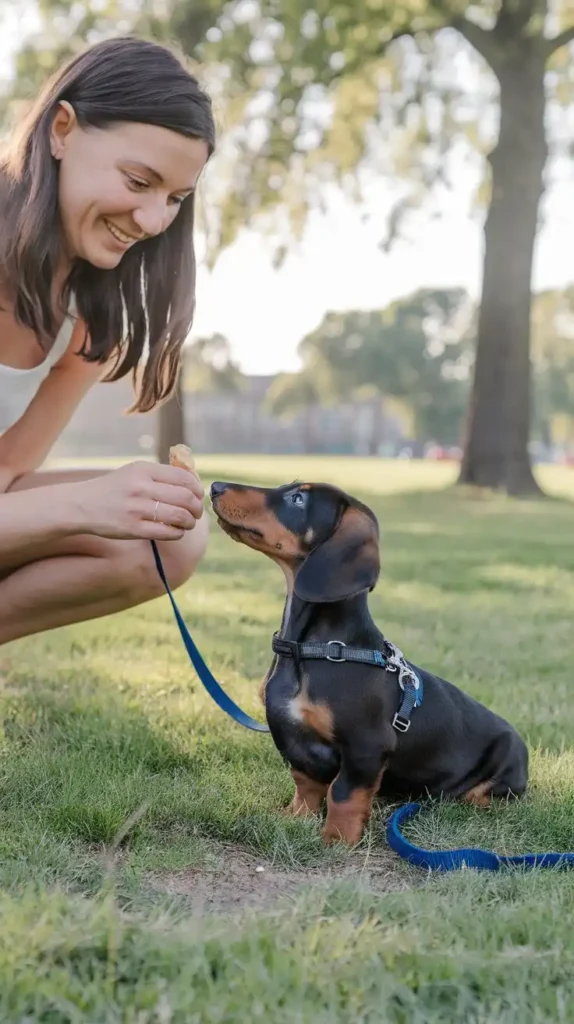
Training your mini Dachshund puppy may require a little extra patience, but it’s a crucial part of raising a well-mannered companion. Their independent streak and curious nature can sometimes make training a challenge, but with the right approach, you’ll see great results. Here are some tips to help you train your mini Dachshund effectively:
Start Early and Be Consistent
The earlier you begin training your mini Dachshund, the better. They’re quick learners, but their stubborn streak means they’ll test your patience. Consistency is essential, as small dogs tend to forget things if they don’t practice regularly.
- Start with simple commands like “sit,” “stay,” and “come.” Use treats and kind words to make your pet happy when they do what you want.
- Be patient and consistent repetition is key to helping them retain commands.
- Keep training sessions short and fun so your puppy will stay excited and interested.
Use Positive Reinforcement
Mini Dachshunds respond best to positive reinforcement. Instead of punishment, reward your puppy for doing the right thing. This builds trust and encourages them to repeat the desired behavior.
- Offer treats, verbal praise, or affection when they follow commands.
- Keep treats small and healthy to avoid overfeeding.
- Focus on rewarding good behavior rather than correcting mistakes, as positive reinforcement helps them learn faster.
Address Common Behavioral Issues
Like any puppy, mini Dachshunds can develop a few habits that need correcting. Early intervention is the best way to address unwanted behaviors before they become ingrained.
- Separation anxiety: Mini Dachshunds tend to get very attached to their owners and may show signs of anxiety when left alone. Gradually increase the time your puppy spends in their crate or in another room to help them become more independent.
- Excessive barking: These little dogs can be vocal, so it’s important to teach them when barking is appropriate. Focus on rewarding calm behavior and distracting them with toys or training when they start barking too much.
- Potty training: Mini Dachshunds are often quick to learn potty training, but accidents can happen. Use a consistent bathroom routine and praise your puppy immediately after they go outside to reinforce the behavior.
Socialization is Key
Socializing your mini Dachshund from a young age helps prevent fear-based behavior and ensures they grow up to be confident and friendly with both people and other dogs. Proper socialization will help them handle new environments and experiences with ease.
- Expose your puppy to different people, other dogs, and various environments early on.
- Take your puppy to puppy classes, dog parks, or arrange playdates with other well-behaved dogs.
- Be gentle and patient during socialization, allowing your puppy to approach new situations at their own pace.
Keep Training Sessions Fun and Engaging
Training a mini Dachshund doesn’t have to feel like a chore! Keep sessions light, playful, and rewarding, which helps them stay motivated and excited to learn. Use toys, treats, and praise to make each session feel like a positive experience.
- Try using interactive toys or puzzles that challenge their mind while also being rewarding.
- Change up the training environment to keep things fresh, whether it’s inside your home or at the park.
- Keep sessions brief 5 to 10 minutes per session is ideal to maintain focus and prevent frustration.
Training your mini Dachshund is a fun journey that helps build a strong bond between you and your furry friend. With patience, consistency, and plenty of positive reinforcement, your puppy will quickly grow into a well-behaved, loving companion that’s a joy to have around.
Health Considerations for Mini Dachshund Puppies
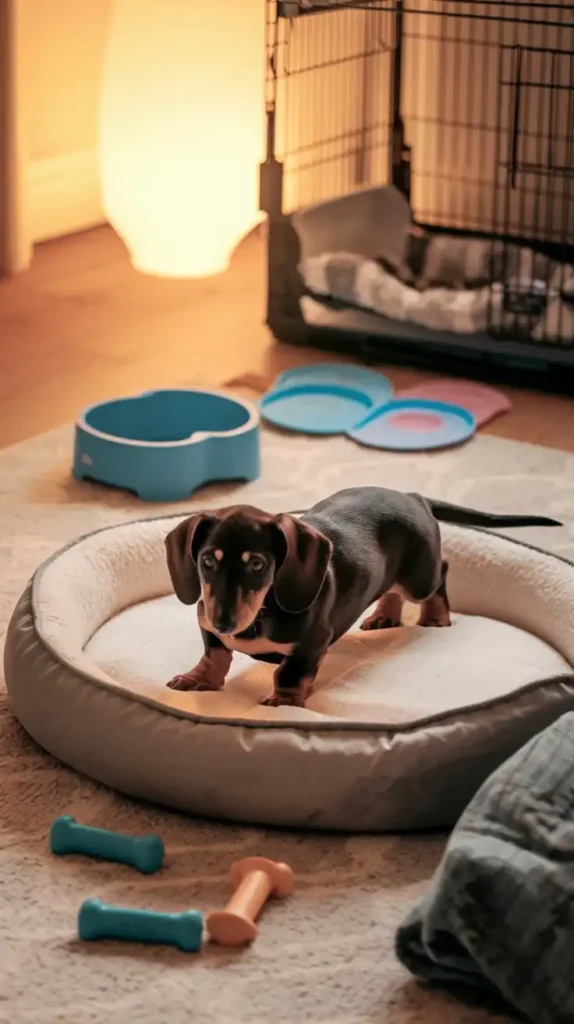
Caring for a mini Dachshund means paying close attention to their unique health needs. While they’re a small and sturdy breed, there are a few health concerns that are common to Dachshunds, especially as they age. By being proactive about their health, you can ensure that your puppy enjoys a long, happy life. Here’s what you need to know:
Watch Out for Back Problems
One of the most common health issues in mini Dachshunds is back problems, especially intervertebral disc disease (IVDD). Their long backs and short legs make them more prone to spinal injuries, so it’s important to take steps to protect their backs.
- Avoid activities that put too much strain on their back, such as jumping from high places or climbing stairs.
- Invest in a dog ramp or stairs if your puppy enjoys jumping on the couch or bed.
- Provide a comfortable, orthopedic bed to support their spine during sleep.
Regular Vet Check-ups
Routine veterinary visits are essential for ensuring your mini Dachshund is healthy. Regular check-ups help detect any health issues early on, allowing for quicker treatment and better outcomes.
- Schedule annual or bi-annual vet visits to keep up with vaccinations, check-ups, and preventative care.
- Ensure that your puppy is up to date on their vaccinations and flea, tick, and worm treatments.
- Regularly monitor your puppy’s weight, as Dachshunds can be prone to obesity, which can worsen back problems and other health issues.
Oral Health Maintenance
Dental care is often overlooked, but it’s just as important for mini Dachshunds as it is for any dog. Their small mouths are prone to plaque buildup, which can lead to dental issues like gum disease.
- Begin brushing your puppy’s teeth early to get them accustomed to the process.
- Use dog-friendly toothbrushes and toothpaste to prevent plaque buildup and maintain oral health.
- Offer dental chews or toys designed to help clean teeth and prevent tartar buildup.
Maintain a Healthy Weight
Mini Dachshunds have a tendency to gain weight if not monitored closely. Their small frames mean that excess weight can put extra strain on their back and joints, leading to long-term health problems.
- Stick to a balanced, portion-controlled diet designed for small-breed puppies.
- Watch out for “puppy eyes” and avoid giving too many treats use them sparingly.
- Ensure your puppy gets regular exercise to maintain a healthy weight and avoid obesity-related health problems.
Keep an Eye on Their Ears
Mini Dachshunds have floppy ears, which make them prone to ear infections. Keeping their ears clean and dry is essential to avoid painful infections that can affect their hearing.
- Check their ears regularly for signs of infection, such as redness, a bad smell, or discharge.
- Clean their ears gently with a vet-approved ear cleaner to prevent moisture buildup.
- If your puppy’s ears appear inflamed or they show signs of discomfort, consult your vet promptly.
By staying vigilant about these common health issues, you can help your mini Dachshund live a long, healthy, and happy life. Regular vet visits, proper care, and attention to their specific needs will go a long way in preventing health concerns and ensuring your puppy grows into a vibrant adult dog. Always remember, a healthy Dachshund is a happy Dachshund!
Grooming Your Mini Dachshund: Keeping Them Looking Their Best
Mini Dachshund puppies are charming little dogs with three different coat types: smooth, long-haired, and wire-haired. While each coat type requires its own grooming routine, all mini Dachshund puppies need regular attention to keep them looking and feeling their best. Let’s dive into the grooming needs of your mini Dachshund puppy so you can keep them clean, comfortable, and happy.
Smooth-Coated Mini Dachshund Grooming
Smooth-coated mini Dachshund puppies have a short, sleek coat that’s relatively low-maintenance. They do shed, but regular grooming can help manage the amount of hair around your home.
- Brushing: Brush your mini Dachshund puppy’s coat once a week with a soft bristle brush or grooming glove to remove loose hair and prevent matting.
- Bathing: They don’t require frequent baths unless they get dirty. Use a gentle dog shampoo to help keep your dog’s skin and fur healthy. Too many baths can dry out their skin, so aim for a bath every 6-8 weeks.
- Nail Trimming: Regular nail trimming is essential to prevent overgrown nails that can cause discomfort or damage. Check and trim your puppy’s nails every 3-4 weeks.
- Ear Cleaning: Clean their ears regularly with a gentle ear cleaner to prevent wax buildup or infections.
Long-Haired Mini Dachshund Grooming
Long-haired mini Dachshund puppies have beautiful, flowing coats, but they require more frequent grooming than their smooth-coated cousins. Regular brushing will help prevent tangles and mats, which can be uncomfortable for your puppy.
- Brushing: Brush your long-haired mini Dachshund puppy at least 2-3 times a week to keep their coat tangle-free. Use a slicker brush or comb to carefully detangle any knots.
- Bathing: Bathe them every 4-6 weeks to keep their coat clean and shiny. Be sure to use a moisturizing shampoo to protect their long fur.
- Ear and Eye Care: Long-haired mini Dachshund puppies often have hair around their ears and eyes that can cause irritation if not properly trimmed. Gently trim the fur around their ears and eyes to keep them comfortable and free of excess hair.
- Nail Trimming: Regular nail care is also important. Cut their nails every 3 to 4 weeks to stop them from getting too long.
Wire-Haired Mini Dachshund Grooming
Wire-haired mini Dachshund puppies have a unique, coarse coat that requires a specific grooming approach. Their wiry texture needs to be hand-stripped (or occasionally clipped) to maintain its shape and condition.
- Hand-Stripping: Hand-stripping involves pulling out dead hair to keep their coat looking neat and well-maintained. You can do this at home or take them to a groomer if you’re unsure about how to do it properly.
- Brushing: Use a wire brush to brush their coat a couple of times a week. This will help take away loose hairs and stop tangles from forming.
- Bathing: Like the other coat types, bathe your wire-haired mini Dachshund puppy every 4-6 weeks, using a gentle dog shampoo.
- Ear and Nail Care: Clean their ears and trim their nails regularly to maintain overall health and comfort.
General Grooming Tips
No matter what coat type your mini Dachshund puppy has, here are some general grooming tips that will benefit all puppies:
- Hydration: Keeping your mini Dachshund puppy hydrated is essential for maintaining healthy skin and coat. Always make sure they can drink clean water.
- Check for Skin Issues: Regularly inspect your puppy’s skin for any signs of irritation, sores, or dry patches. If you notice anything unusual, consult your vet.
- Seasonal Grooming: Mini Dachshund puppies shed more during seasonal changes. Be prepared to groom more often during shedding seasons (spring and fall) to stay on top of hair loss.
Grooming as Bonding Time
Grooming is an excellent way to bond with your mini Dachshund puppy. It allows you to check for any signs of health issues, such as lumps or skin conditions, while providing them with attention and affection. Make grooming sessions a fun and positive experience for your puppy by rewarding them with praise or treats.
By keeping a consistent grooming routine, your mini Dachshund puppy will not only look fantastic but also feel comfortable and healthy. Whether they’re a smooth, long-haired, or wire-haired variety, regular grooming will strengthen your bond and ensure they always feel their best.
Feeding Your Mini Dachshund Puppy: Nutrition for Growth and Health
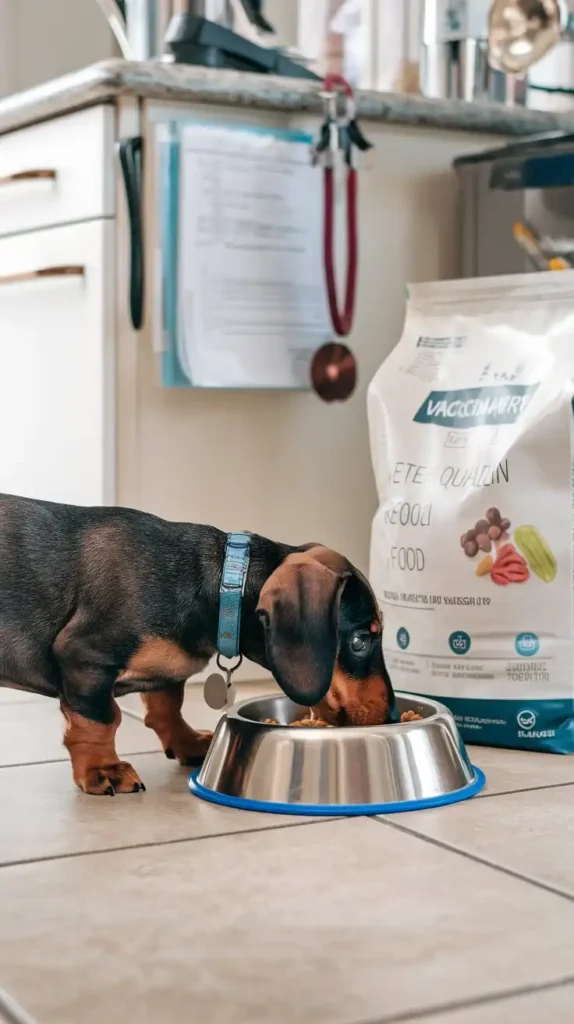
Proper nutrition is vital for the health and growth of mini Dachshund puppies. These little dogs have specific dietary needs, and providing them with the right nutrients will ensure they thrive throughout their development. From the right type of food to portion control, here’s how to make sure your mini Dachshund puppy is well-nourished.
Choosing the Right Food for Mini Dachshund Puppies
Mini Dachshund puppies have small bodies and unique dietary requirements. It’s essential to choose a high-quality, age-appropriate puppy food that supports their growth, energy levels, and overall health.
- Puppy-Specific Diet: Look for dog food that is specially formulated for puppies. These formulas are higher in calories, protein, and essential nutrients to support their rapid growth.
- Small Breeds Formula: Since mini Dachshunds are small dogs, consider feeding them food designed for small breed puppies. These formulas are made with smaller kibble sizes that are easier for your puppy to chew.
- High-Quality Protein: Ensure that the food contains real meat, such as chicken, turkey, or lamb, as the primary ingredient. Protein is essential for muscle development and overall health.
- Balanced Nutrients: Look for a well-balanced food that includes healthy fats, vitamins, and minerals like DHA (docosahexaenoic acid) for brain development, and calcium for strong bones.
How Much to Feed Your Mini Dachshund Puppy
Portion control is important to prevent obesity, a common concern for Dachshunds due to their small size and love for food. Your mini Dachshund puppy’s feeding needs will vary based on their age, size, and activity level.
- Follow the Packaging Guidelines: Puppy food packaging often includes a guide on the recommended daily portion based on your puppy’s age and weight. Start with these guidelines, but adjust portions as needed based on your puppy’s growth and energy levels.
- Feed Multiple Meals: Since mini Dachshund puppies have small stomachs, it’s best to feed them smaller meals throughout the day. For puppies under six months, aim for three meals a day, and reduce to two meals after six months.
- Monitor Weight: Keep an eye on your puppy’s weight and body condition. If they’re gaining too much weight, reduce portions slightly. If they’re losing weight, increase the portion size. Consult your vet if you’re unsure about portion sizes.
Treats and Snacks for Mini Dachshund Puppies
While treats can be a fun way to train and bond with your mini Dachshund puppy, they should only be given in moderation.
- Healthy Treats: Choose treats made with natural ingredients, and avoid those with excessive sugar or fillers. Dog training snacks should be small and have few calories.
- Vegetable Snacks: Mini Dachshund puppies love crunchy treats like baby carrots, green beans, or apple slices. These snacks are low in calories and can help with their dental health.
- Limit Table Scraps: It’s tempting to give your puppy some of your food, but it’s important to stick to treats specifically designed for dogs. Human food can upset their stomach or be harmful.
Water for Mini Dachshund Puppies
Hydration is just as important as nutrition. Make sure your mini Dachshund puppy always has access to fresh, clean water. Puppies are more active and require more water than adult dogs, so it’s crucial to keep their water bowl filled throughout the day.
- Water Bowl Size: Use a shallow water bowl to prevent your puppy from tipping it over. Be sure to clean the bowl regularly to avoid bacterial buildup.
- Monitor Water Intake: If you notice your puppy drinking unusually large amounts of water or not drinking enough, it may indicate a health issue. In such cases, consult your vet promptly.
Special Considerations for Feeding Mini Dachshund Puppies
Mini Dachshund puppies are prone to some health issues that can affect their eating habits. It’s essential to be mindful of these factors to keep your puppy healthy.
- Back Problems: Dachshunds are prone to intervertebral disc disease (IVDD), a condition that affects their spine. Keeping your puppy at a healthy weight by providing balanced meals and avoiding overfeeding can help reduce the strain on their back.
- Avoid Overfeeding: Dachshunds, especially miniatures, can be prone to obesity. Stick to proper portion sizes and limit high-calorie treats to maintain a healthy weight.
With the right nutrition, your mini Dachshund puppy will grow into a strong, happy, and healthy adult dog. By feeding them quality food in the right amounts and offering healthy snacks, you’ll ensure they receive the nutrients they need to thrive throughout their life.
Choosing and Adopting Your Mini Dachshund Puppy
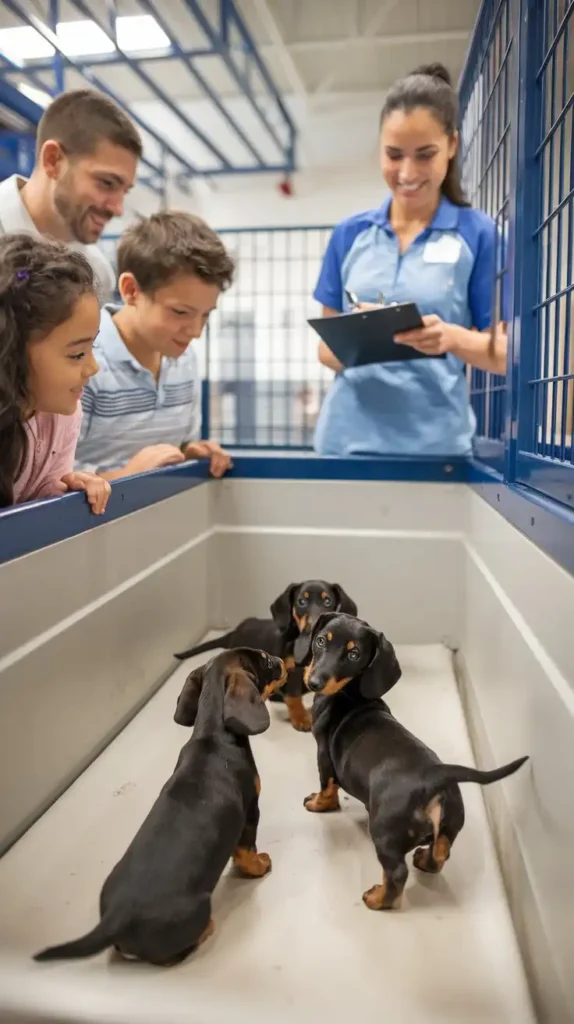
Bringing a mini Dachshund puppy into your home is an exciting and rewarding experience. However, before you adopt one, it’s essential to do thorough research and carefully consider a few key factors to ensure you are ready for the responsibility of raising a healthy and happy puppy. Whether you are adopting from a breeder or a rescue organization, here’s what you need to know to make an informed decision.
Understanding the Mini Dachshund Breed
Before adopting a mini Dachshund puppy, it’s important to fully understand the breed’s characteristics, needs, and temperament. Mini Dachshunds are known for their playful, loyal, and curious nature, making them excellent companions. Sometimes, they can also be strong-willed and not easily persuaded.
- Size: Mini Dachshunds typically weigh between 8 to 11 pounds and stand around 5 to 7 inches tall. Their small size makes them ideal for apartment living, but they still need plenty of exercise and stimulation.
- Temperament: Mini Dachshunds are affectionate and enjoy spending time with their family members, but they can also be a bit stubborn and independent. They have a strong hunting instinct and may try to dig or burrow into small spaces.
- Health Concerns: Dachshunds, particularly miniatures, are prone to certain health issues, such as back problems due to their long spines. It’s essential to be aware of these risks and provide appropriate care throughout their life.
Finding a Reputable Breeder or Rescue
Once you’ve decided to adopt a mini Dachshund puppy, the next step is finding a reputable breeder or rescue organization. Whether you’re going through a breeder or adopting from a shelter, choosing a trustworthy source is crucial for your puppy’s health and well-being.
- Reputable Breeder: Look for a breeder who is knowledgeable about the breed and prioritizes the health and temperament of their puppies. A good breeder will provide health clearances for the puppy’s parents and ensure that they are raised in a loving, social environment.
- Ask to meet the puppy’s parents to observe their temperament and health.
- Ensure the breeder follows ethical practices, including socializing the puppies and providing appropriate veterinary care.
- Avoid purchasing from breeders who prioritize profit over the well-being of the dogs.
- Adoption from a Rescue: There are many rescue organizations that specialize in Dachshunds or small dogs. Adopting from a shelter or rescue group can be a great option if you are interested in giving a dog a second chance at a loving home.
- Many rescue organizations screen dogs for temperament and health before placing them in adoptive homes, so you can be assured you’re bringing home a well-adjusted puppy.
- Consider adopting a puppy from a rescue organization or animal shelter if you are open to giving a puppy or adult Dachshund a forever home.
Choosing the Right Mini Dachshund Puppy
When selecting a mini Dachshund puppy, it’s important to choose one that fits well with your lifestyle and personality. Keep in mind that each puppy has its own unique traits, and you want to ensure that your new puppy will thrive in your home.
- Energy Level: Some mini Dachshund puppies may be more active and playful, while others may be more laid-back and relaxed. Spend time with the puppy to observe its energy level and personality to determine whether it’s a good match for you.
- Temperament and Behavior: Mini Dachshunds are known for their bold personalities. Choose a puppy that is well-socialized, friendly, and comfortable being handled by different people.
- Take time to meet the puppy’s siblings and mother, if possible, to assess their temperament and socialization skills.
- Look for a puppy that is curious but not overly shy or fearful, as this could indicate potential behavioral issues.
- Health and Physical Condition: A healthy puppy should have clear eyes, a shiny coat, and an alert demeanor. Ask the breeder or rescue about any known health issues in the puppy’s lineage, and ensure that the puppy has received proper vaccinations and deworming treatments.
The Adoption Process
Once you’ve found the right mini Dachshund puppy, the adoption process begins. Whether you’re working with a breeder or a rescue, there are a few steps you should expect to take before bringing your new puppy home.
- Application Process: Most breeders and rescues require an application to ensure you are a suitable pet parent. Be prepared to answer questions about your experience with pets, living situation, and readiness for a puppy.
- The breeder or rescue will assess whether you have the time, space, and resources to care for a mini Dachshund puppy.
- Some organizations may also conduct home visits or ask for references to ensure the puppy will be in a safe and loving environment.
- Adoption Fees: Be aware that there may be adoption or purchase fees involved. These fees often cover vaccinations, spaying or neutering, and other medical care the puppy has received. Prices can vary, so make sure to discuss the cost upfront.
- Adoption fees for rescue puppies are typically more affordable than purchasing from a breeder, but the overall cost of puppy care will be ongoing.
- Transition Period: When you first bring your mini Dachshund puppy home, be prepared for a transition period. Your new puppy will need time to adjust to their new surroundings, and you’ll need to establish routines for feeding, potty training, and bonding.
- Make the place calm and quiet to help the puppy feel comfortable in their new home.
- Spend time with your puppy. This will help them feel safe and loved.
Preparing Your Home for Your New Mini Dachshund Puppy
Before bringing your puppy home, it’s essential to prepare your living space to ensure it’s safe and comfortable. Here are a few things you can do to create a welcoming environment for your mini Dachshund puppy:
- Puppy-Proofing: Mini Dachshund puppies are small and curious, so make sure your home is safe for them. Remove any hazardous items, such as small objects they might swallow or access to harmful chemicals.
- Create a Safe Space: Designate a cozy area in your home where your puppy can retreat to when they need rest. This could be a crate, a puppy pen, or a specific room with soft bedding.
- Gather Essentials: Make sure you have the necessary supplies, including a bed, food and water bowls, toys, grooming tools, and a leash and collar. Having everything ready before your puppy arrives will help ease the transition.
Bringing a mini Dachshund puppy into your life is an incredible experience that brings joy, love, and endless companionship. By choosing a reputable source, carefully selecting your puppy, and preparing your home, you’ll be well on your way to creating a lifelong bond with your new furry friend.
An authoritative site on everything related to Dachshunds, from breed history to care and events: Dachshund Club of America
Expert Notes on Raising Mini Dachshund Puppies
Raising a mini Dachshund puppy is an incredibly rewarding experience, but it also requires patience, commitment, and understanding of the breed’s unique needs. Here are a few expert insights to guide you through the process:
- Socialization is Key: Mini Dachshund puppies can be independent, which may sometimes lead to stubborn behavior. Early socialization is crucial to help them grow into well-behaved and confident dogs. Expose your puppy to different environments, people, and other pets to build their social skills and reduce the risk of behavioral issues as they grow.
- Dachshunds have long backs, which makes them more likely to have health issues, especially with their spines. One common problem is called intervertebral disc disease (IVDD). This can cause pain and other issues, so it’s important to take care of their back health. To minimize the risk, avoid activities that put undue strain on their back, such as jumping from high places. Regular vet check-ups, a healthy diet, and maintaining a healthy weight will also help support their long-term health.
- Mental Stimulation: As intelligent and curious dogs, mini Dachshunds need mental stimulation to stay happy and avoid boredom. Interactive toys, puzzle feeders, and training sessions are excellent ways to engage their minds and prevent destructive behaviors.
- Exercise and Play: While mini Dachshunds may be small in size, they are energetic and enjoy regular play sessions. Daily walks, combined with playtime in a secure area, will help them stay physically fit and emotionally satisfied.
- Crate Training: Crate training is highly beneficial for housebreaking and providing your puppy with a safe space of their own. A crate should be seen as a positive environment, not a punishment. Make it cozy with bedding and toys, so your puppy feels comfortable and secure in their crate.
Conclusion
Choosing to adopt a mini Dachshund puppy is a big decision that will bring years of love, joy, and companionship. By understanding the breed’s characteristics, choosing the right puppy, and preparing your home, you’re setting yourself and your new furry friend up for success. Remember that raising a mini Dachshund requires time, attention, and consistency, but the reward of a loyal and loving companion is worth every bit of effort. Whether you’re bringing home a puppy from a breeder or adopting from a rescue, the bond you’ll share will be truly special. So, embrace the journey, enjoy the little moments, and create a life full of happiness with your mini Dachshund by your side!

